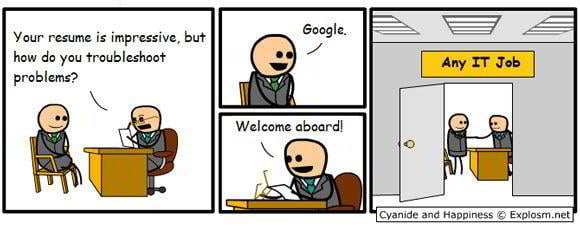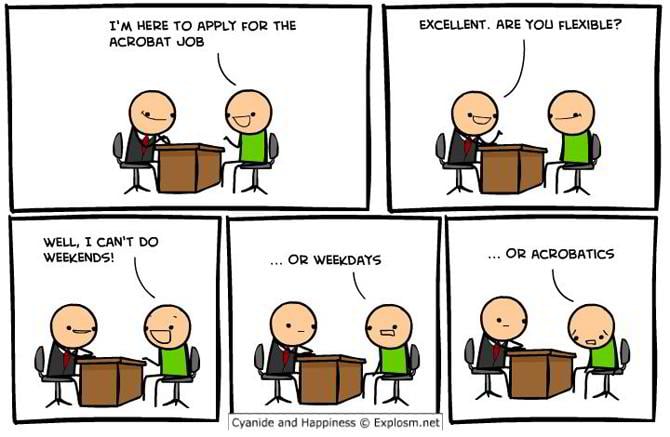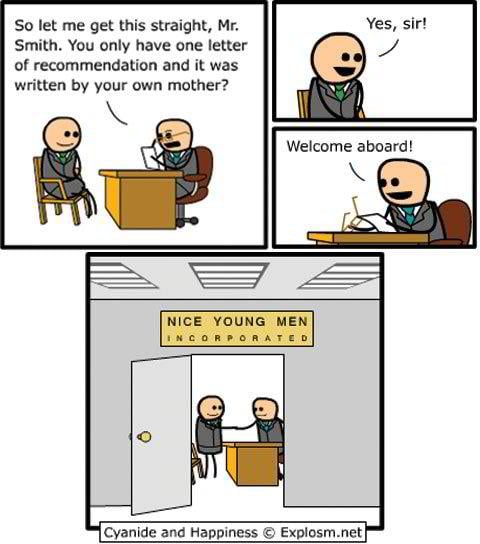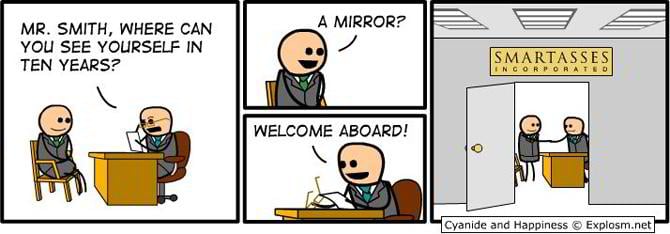Ever Felt Stupid After the Job Interview? Tips to Meet the Situation Head-on Next Time!
I felt stupid many times after the job interviews as I couldn’t understand if the HR managers liked me or not… If you have the same problem, if chill sweats are your usual state before the interview, if you start to hum and haw something obscure when you are asked a question instead of giving the direct answer (which you know quite well), read this blog post. It will provide you with job interview tips for web developer / designer or any other position you’d like to try.
So, let’s get to know how to prepare for an interview / how to answer job interview questions no matter whether it is your first, second, fifth attempt in order not to cry over spilt milk afterwards. By the way, the tips you will find here fit for managers who need to interview new employees for the company either. Following them you will make a good impression on a future employer or employee. This may serve a kind of guide on keys to a strong interview; it will help you with all of these situations.
As you work through this article, keep in mind that positive, productive, nonverbal communication is the first step in a successful interview. Yes, I am speaking about body language. But how to practice it?
Practice your body language
Look at pictures of yourself in different situations; practice an interview situation and film yourself. This is a great way to catch sight of something unnatural or maybe obnoxious in your behavior.
Get to know more about body language from Amy Cuddy’s TED Talk: “Your Body Language Shapes Who You Are”.
We also advise you to check out an article on CNN Money and learn how body language affects business negotiations.
After watching the video and reading the article you will understand much better how to use your body language most effectively.
Are you ready to pass straight to the web development interview questions?
I offer you to view it not as something intimidating, but as your chance to impress for success. Herein under we will look at the most common job interview questions and how to answer them appropriately.
Most interviews feature three categories or types of questions about your ability, your willingness, which means how much you want to work with the company, and how well you’ll fit in with the new job and organization.
Let’s start with ability
Let’s look at some examples of questions in this category.
- What is your greatest strength?
- What are your best skills?
- What qualifications do you have that would make you successful here?
To answer these questions, you must learn as much as you can about the organization that you are applying to. It may be an international company with offices all over the world or a small local web design agency. It could be a technology startup or a nonprofit which is a company that works to help people. You will feel more comfortable and interviewers will see that you are really interested and can talk easily about the organization. And show how your strengths and skills are good for their organization. You also want to know about the actual job that you’re applying for (they might need a designer, say, to create their corporate graphics or web presentation or both). You may even be asked to solve problems similar to the problems on the job (to draw a company logo or promo banner, for example). When you know what the job requires you can talk more easily about how you can do the job.
Next, let’s look at willingness
Here are some examples of questions in this category.
- What kind of student were you?
- Describe a very successful web design project you completed in your current job.
- How do you handle problems and setbacks?
For these types of questions, your personal experience is key. You want to be ready to show the interviewer that you work hard and you don’t give up easily. You want to be prepared with actual examples that show your initiative and desire to be successful and your willingness to overcome problems (this is the right time to draw interviewers’ attention to some of the projects in your portfolio). These will help you stand out among others applying for the same job.
Finally, employers want to know if you’ll be a good fit for their organization. Do you belong there?
Here are some questions they might ask.
- What’s important to you in a work situation?
- Do you think you’re a natural leader?
- How do you adjust to new situations?
Again, knowing about the organization and the job will help you answer these questions in the most positive way. You want every answer you give to support your chance at getting the job, and even if you have to give a negative answer, think of ways to turn it into a positive.
Now let’s look at some answers for the interview questions for web developer we looked at
- What’s your greatest strength?
- I’m very organized. And that’s important in every job. But for the position of web designer, I think my greatest strength is communication. I know I’ll be working with team members and new customers…
Why is that a good response? It gives the direct answer and it refers to the actual job the employer is trying to fill. How about this one?
- How do you handle setbacks?
- I’d like to answer that question with a story. I worked on a web design project before…
This answer works because telling a story is a key way to catch someone’s attention, and it gives you a chance to share a personal experience that says a lot about you.
Let’s try one more.
- Do you think you’re a natural leader?
- I’m a leader. But I don’t think I’m a natural at it. I have learned to be a leader, however. For example, last year…
Sometimes in order to be honest, we have to give a negative answer. This is a good answer because it shows how a negative can become a positive.
What stands out in all of these? Preparation. You must be ready to answer the question and to match your answer to the job and the organization.
At the end of an interview, employers often ask for your questions
For this situation also, you must be ready. Prepare a question or two to show both your interests in the company and that you want to learn more. Here are a few examples.
- I read on your website about your upcoming new HTML multipurpose theme/product. Could you tell me a little more about it?
- What are some characteristics of your most successful web designers?
- What can I do next to get the position of web designer?
Let’s discuss some more interview questions and appropriate answers on them
What are your weaknesses?
This is the most dreaded question of all. Handle it by minimizing your weakness and emphasizing your strengths. Stay away from personal qualities and concentrate on professional traits.
So what is the best way to answer this common interview question?
Assess your skills, and you will identify your strengths. This is an exercise worth doing before any interview. Make a list of your skills, dividing them into three categories:
- Knowledge-based skills: acquired from education and experience (e.g., computer skills, languages, degrees, training and technical ability).
- Transferable skills: your portable skills that you take from job to job (e.g., communication and people skills, analytical problem solving and planning skills).
- Personal traits: your unique qualities (e.g., dependable, flexible, friendly, hardworking, expressive, formal, punctual and being a team player).
When you complete this list, choose three to five of those strengths that match what the employer is seeking in the job posting. Make sure you can give specific examples to demonstrate why you say that is your strength if probed further.
Assessing your weaknesses
Everyone has weaknesses, but who wants to admit to them, especially in an interview? The best way to handle this question is to minimize the trait and emphasize the positive. Select a trait and come up with a solution to overcome your weakness. For example: "I pride myself on being a 'big-picture' guy. I have to admit I sometimes miss small details, but I always make sure I have someone who is detail-oriented on my team."
Scripting your answers
Write a positive statement you can say with confidence:
"My strength is my flexibility to handle change. As web designer at my last job, I was able to turn around a negative working environment and develop a very supportive team. As far as weaknesses, I feel that my management skills could be stronger, and I am constantly working to improve them."
When confronted with this interview question, remember the interviewer is looking for a fit. They are forming a picture of you based on your answers. A single answer will probably not keep you from getting the job, unless, of course, it is something blatant. Put your energy into your strengths statement. Your strengths are what you have to offer. Then let the interviewer know that although you may not be perfect, you are working on any shortcomings you have.
Why should we hire you?
Summarize your experiences: "With five years' experience working in the web design industry and my proven record of increasing the company income, I could make a big difference in your company. I'm confident I would be a great addition to your team."
Frankly speaking, your answer to this interview question could make or break your chances. You need a brief pitch that matches your experiences with an employer's needs.
The wrong track
You answer by saying, "Because I need and want a job." That's nice, but the bottom line here is, "What can you do for us?"
"I'm a hard worker and really want to work for this company." The majority of people think of themselves as hard workers - and why this company?
The right track
Your answer to this question is, "Because I'm a good fit for the position." Getting warmer, but more details, please.
"I have what it takes to solve problems and do the job." This is the best answer so far. Expand on this, and you've got it.
Develop a sales statement
The more detail you give, the better your answer will be. This is not a time to talk about what you want. Rather, it is a time to summarize your accomplishments and relate what makes you unique.
Product inventory exercise
The bottom line of this question is, "What can you do for this company?"
Start by looking at the job description or posting. What is the employer stressing as requirements of the job? What will it take to get the job done? Make a list of those requirements.
Next, do an inventory to determine what you have to offer as a fit for those requirements. Think of two or three key qualities you have to offer that match those the employer is seeking. Don't underestimate personal traits that make you unique; your energy, personality type, working style and people skills are all very relevant to any job.
The sales pitch: you are the solution
From the list of requirements, match what you have to offer and merge the two into a summary statement. This is your sales pitch. It should be no more than two minutes long and should stress the traits that make you unique and a good match for the job.
Example: "From our conversations, it sounds as if you're looking for someone to come in and take charge immediately. It also sounds like you are experiencing problems with innovative web development solutions. With my seven years of experience working on various web development projects, I have earned companies thousands of dollars by streamlining systems. My high energy and quick learning style enable me to hit the ground and size up problems rapidly. My colleagues would tell you I'm a team player who maintains a positive attitude and outlook. I have the ability to stay focused in stressful situations and can be counted on when the going gets tough. I'm confident I would be a great addition to your team."
What makes you unique?
Completing an exercise around this question will allow you to concentrate on your unique qualities. Like snowflakes, there are no two alike people. Take some time to think about what sets you apart from others. Let the interviewer know that you have been listening to the problem and have what it takes to do the job - that you are the solution to the problem.
Why do you want to work here?
The hiring manager asks a rather simple interview question, yet it catches you off guard: "Why do you want to work for this company?" The obvious answer that comes to mind is, "Because you have an opening, and I need a job." While this may be true, it won't earn you any points in a job interview.
The interviewer is looking for an answer that indicates you've thought about where you want to work - that you're not just sending your resume to any company with a job opening. Researching the company and industry before your interview will make you stand out as a more informed and competent applicant.
When an interviewer asks you “Why do you want to work here?” you should use this opportunity to show that you've done your homework on the company and how you might fit into the open role.
For instance, you are the first candidate interviewed for a web designer position. When you are asked why you want to work there, you reply, "I have always wanted to work for this company. I love your products, and I have used them for many years. And it seems that this job would be perfect for me, a real opportunity for me to grow and develop."
Your answer begins well, but then shifts to what you can get out of the experience instead of what you have to offer. Your answer would be stronger if you proved you had researched the industry and company, and therefore could discuss more than your own experience with the products.
Another candidate answers more directly: "Based on the research I've done, this company is an industry leader. When I visited your Web site, I found some impressive information about future projects you have planned. I was also impressed with the founders' backgrounds and the current financial statements. This is the company I've been looking for, a place where my background, experience and skills can be put to use and make things happen."
This answer demonstrates candidate’s interest in and enthusiasm for the company and what it stands for. He/she also demonstrates how he/she envisions he/she could be a member of the team.
You must do research before the interview and come up with two or three reasons you want to work for the company. Search company Web sites for mission statements, product and service information, principals' backgrounds and contact information. Check company financials through the US Securities and Exchange Commission.
It would also be beneficial to think of at least two reasons this job is a good match for your skills, strengths, experience and background. What can you bring to the company? Write down your thoughts and rehearse them as part of your script.
There are no right or wrong answers to this question. Your answer should reflect that you have thought about what you want and have researched the company. Let the interviewer know you are being selective about where you want to work and you're not just going to take any job offered to you. Demonstrate that this is the company you want to work for - a little flattery will go a long way.
What are your goals?
Sometimes it's best to talk about short-term and intermediate goals rather than locking yourself into the distant future. For example, "My immediate goal is to get a job in a growth-oriented company. My long-term goal will depend on where the company goes. I hope to eventually grow into a position of responsibility."
Try these exercises to stay focused so you can clearly state your goals with ease.
Open-ended interview questions such as "What are your long-term goals?" and "Where do you see yourself in five years?" throw most candidates off balance. Interviewers ask this question to gain insight into your self-awareness and communication skills.
A staffing manager is about to interview three people for a project manager position. He/she is looking for someone with planning skills and long-range vision. He/she asks each of them, "What are your long-term goals?"
"To be a marketing manager within five years and have a hand-picked team reporting to me," replies the first candidate. This is a very specific and narrow goal, which may not be an option at this company. The "hand-picked" team reference demonstrates a lack of flexibility. It's best to stay away from too specific a goal.
"I have been so busy with my responsibilities and achieving company goals that I have not focused on personal long-term goals," answers the second candidate. While a strong work ethic is certainly desirable, this answer does not demonstrate vision or planning.
The third candidate answers the question with: "I plan to return to school to earn my MBA and have my own consulting business one day." While it pays to be honest, this answer could turn the interview in the wrong direction very quickly. The employer is looking for someone to stick around for the long run, not to stop over on the way to a new career.
So how could these candidates provide better answers?
Get Focused
If you are the type of person who prefers an organized way of life, you may find this question a piece of cake to answer. But if you're among the majority of people who let life happen as it comes along, you will probably not have a smooth answer without some forethought.
What are your goals? Think about what you really want. Most successful business people will tell you that a key success factor is the ability to set and achieve goals.
Begin by setting short-term goals. Right now your goal may be to get a job. But what kind of job? And where do you go from there?
Be employer-centered. The employer is looking for someone to come in and solve problems. Since planning is a key factor in this job, think of examples where your planning has affected the results.
Scripting
After giving some thought as to where you want to go and how you can help the employer achieve results, try scripting your answer. Here's an example:
"I have learned that long-term goals are best achieved when I break them into shorter goals. My short-term goal is to find a position that will put me in a forward-moving company with solid performance and future projections. As part of a team, I want to add value and continue to grow the company. My long-term goal will depend on where the company goes. My plan is to move into a position of responsibility where I can lead a team."
No one can tell you exactly how to answer this question, since your response will come from what is important to you. However, the more focused and employer-centered you can be about your goal, the better your chances will be of steering the interview in the right direction.
Why did you leave (or why are you leaving) your job?
Be sure your answer quells any potential concerns about your professional track record.
If you're unemployed, state your reason for leaving in a positive context: "I managed to survive two rounds of corporate downsizing, but the third round was a 20% reduction in the workforce, which included me."
If you are employed, focus on what you want in your next job: "After two years, I made the decision to look for a company that is team-focused, where I can add my experience."
There are many reasons you might have left your last job, and not all of them are rosy. Perhaps you worked for a toxic boss or you met obstacles on your way up the ladder. Or maybe you were just plain bored with your work.
When an interviewer asks you why you want to leave your current job, he or she wants to try to “understand your motives and gain insight as to how [you] handle work relationships,” says Duncan Mathison, author of Unlock the Hidden Job Market: 6 Steps to a Successful Search When Times are Tough. “In particular they are asking themselves, ‘Will they leave us in the lurch if they become dissatisfied?’ or ‘Is there some dirt here?’” In short, asking “Why did you leave your last job?” is one way for the interviewer to ensure you’re a person of integrity.
How to answer interview questions like this?
The best strategy for effectively answering this tough interview question is to prepare for it. Here’s how to be ready and how to recover when you’re not.
Emphasize results
Do: Focus on results: Make a list of things you accomplished in your last position and focus on those, ending with something like, "‘Having successfully done that, I'm ready for another challenge,’" suggests Stephen Balzac, president of 7 Steps Ahead, a business consulting firm in Stow, Massachusetts. “Now what you're saying to the interviewer is: ‘You can count on me to get results and stay here until I do.’"
Don’t: Answer in a way that doesn't reassure the interviewer. “Answers such as, ‘I wasn't being challenged’, ‘The work was no longer interesting’ or ‘The pay was too low’ all say the same thing to the interviewer: that you might leave at any time if things aren't to your liking,” says Balzac.
Recover: If you give a bland answer, circle back to it quickly. And if you can’t, revisit why you left your last job just before you end the interview. This allows you to leave the interviewer with your previous accomplishments top of mind.
Be polite
Do: Remember that employers run the show and can act as they see fit, according to Mathison. “Yet at the same time, make it clear that the organization you seek has the qualities to perform at a higher level,” he says. An example: “We all know that sometimes promises exceed reality. Our CEO was comfortable, as many are, with pushing the limits. But I feel that lasting business partnerships and profitability are built on my ability to deliver on my promises, so I’m looking for that type of company.”
Don’t: Badmouth the boss or the company. “That implies you may be difficult to manage,” Mathison says.
Recover: Acknowledge you were hard on your previous employer and restate your answer like this: “That might be a little harsh. I know that my former company is trying to do its best under the circumstances. I’m looking for a company that’s a better fit for me.” This also shows that you’re self-aware and have decent manners.
One final tip for the interview
I interviewed for a job relevant to my major. The interview went horribly. This morning, I was offered the position.
Don’t dwell too long on your previous employer - the interview is about you, after all. “Always bring the conversation back to your results and reliability,” Balzac notes.
When were you most satisfied in your job?
The interviewer wants to know what motivates you. If you can relate an example of a job or project when you were excited, the interviewer will get an idea of your preferences. "I was very satisfied in my last job, because I worked directly with the customers and their problems; that is an important part of the job for me."
What can you do for us that other candidates can't?
What makes you unique? This will take an assessment of your experiences, skills and traits. Summarize concisely: "I have a unique combination of strong technical skills, and the ability to build strong customer relationships. This allows me to use my knowledge and break down information to be more user-friendly."
What are three positive things your last boss would say about you?
It's time to pull out your old performance appraisals and boss's quotes. This is a great way to brag about yourself through someone else's words: "My boss has told me that I am the best designer he has ever had. He knows he can rely on me, and he likes my sense of humor."
What salary are you seeking?
It is to your advantage if the employer tells you the range first. Prepare by knowing the going rate in your area, and your bottom line or walk-away point. One possible answer would be: "I am sure when the time comes, we can agree on a reasonable amount. In what range do you typically pay someone with my background?"
If you were an animal, which one would you want to be?
Interviewers use this type of psychological question to see if you can think quickly. If you answer "a bunny," you will make a soft, passive impression. If you answer "a lion," you will be seen as aggressive. What type of personality would it take to get the job done? What impression do you want to make?
Final thoughts
We sincerely hope that after reading this article you will never ever feel awkward during the job interview and stupid after it as now you know the main secret of winning the HR manager’s heart – it’s preparation of course. Following these guides (click this link for top 100 job interview questions to study the matter inside out) you can prepare for your next interview substantially and make a good impression on the recruiting manager. You need a little bit of patience to get all the homework done, but it’s worth the trouble as your chances to take up a better position with higher salary, and growth perspectives go up incredibly.
And now, please answer a few questions on the blog post and make the author happy:). Have you ever felt stupid after your job interview? Could you specify the questions that are on our list or are missing there that led to your interview paralysis? Do you think the above guides will help you next time? If your answer to the last question is positive or you know someone who is getting ready for a job interview, like and share this post.
See you soon on MonsterPost and good luck building your career.
P.S. Below in the comments section publish your favorite gifs about job interview, let's laugh together!
Get more to your email
Subscribe to our newsletter and access exclusive content and offers available only to MonsterPost subscribers.









Leave a Reply
You must be logged in to post a comment.